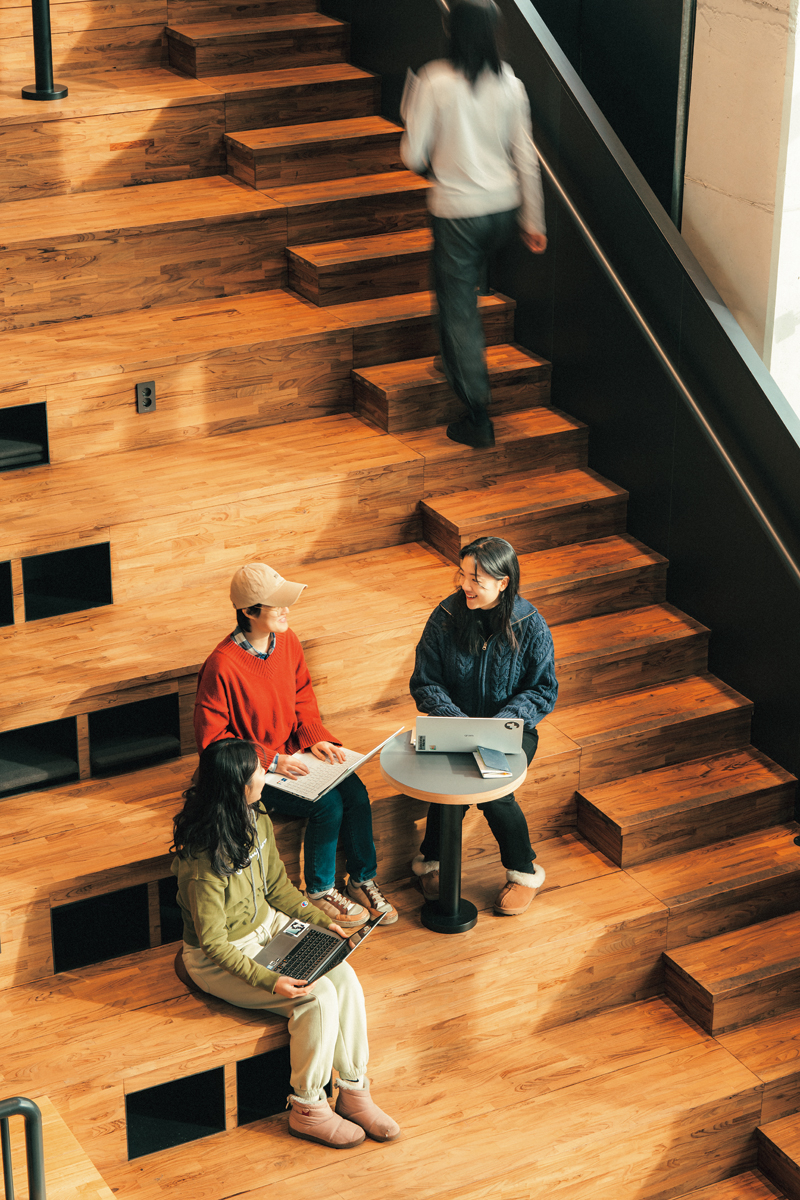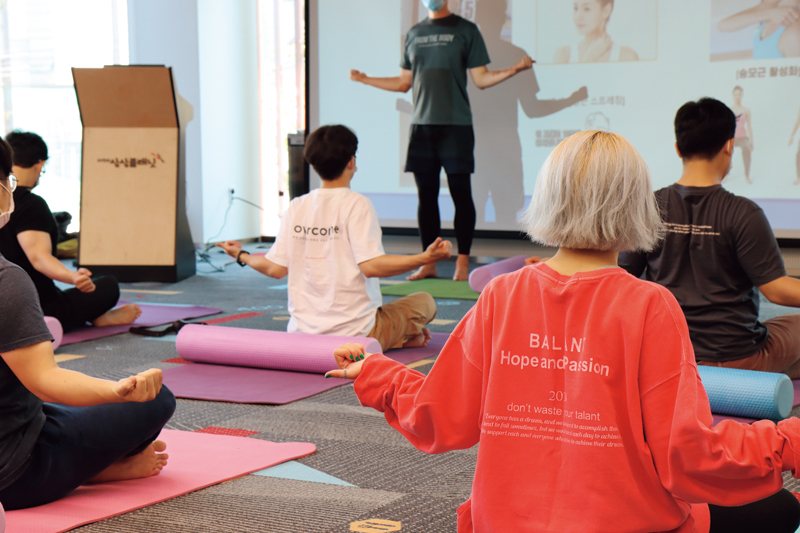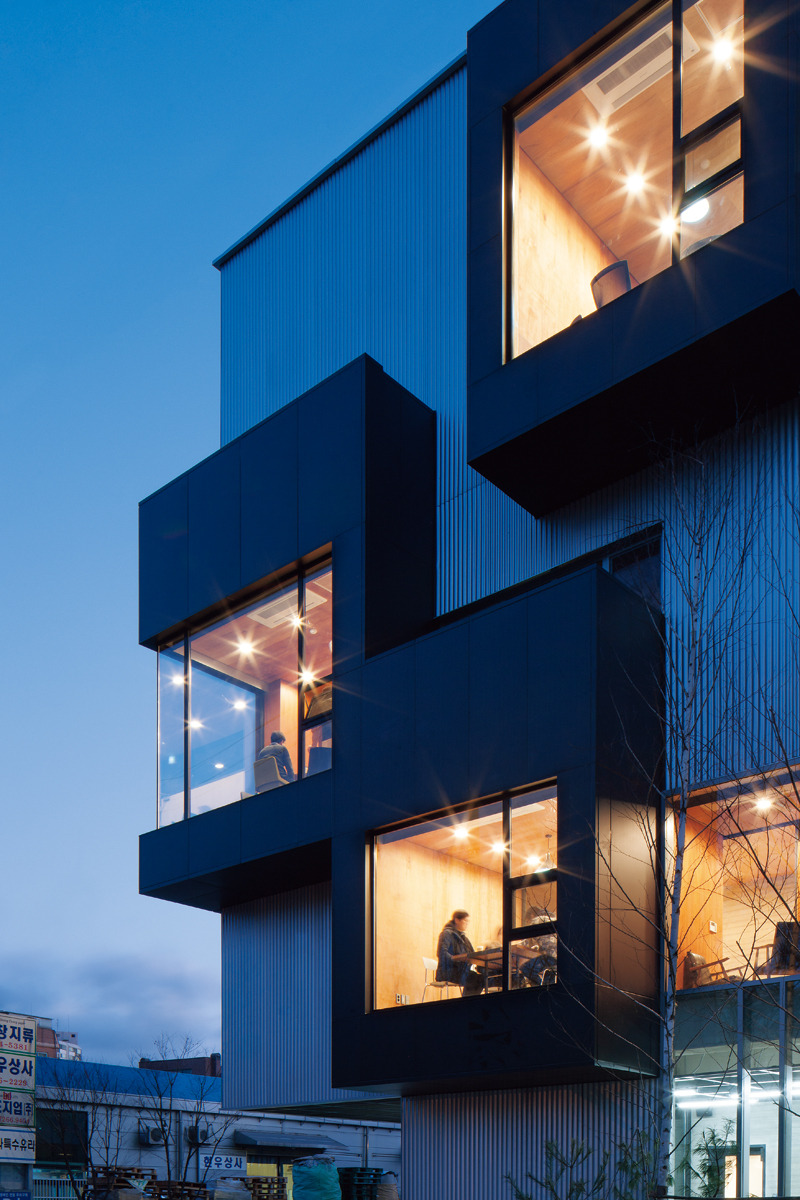Since the mid-2010s, institutions and organizations involved with social innovation have flocked to Seongsu-dong, laying the groundwork for what has become known as Korea’s “Social Venture Valley.”

HEYGROUND. Courtesy of Root Impact
How can we prevent rental scams?
What can we do about the climate crisis?
Can we change the world?
These are some of the questions on a bulletin board inside the lobby of HEYGROUND, a coworking space in the heart of Seongsu-dong. It is called the “Lighthouse of Seongsu-dong” because its lights are always on, thanks to a group of people called “Changemakers.”
This community of entrepreneurs strives to find innovative solutions to social and environmental issues. Their wide-ranging interests include healthy living, fair educational opportunities, climate change, sustainable urban development, and the creation of quality jobs — topics that stoke animated discussions well into the night.
CONVERGING IN ONE SPOT
Today, Seongsu-dong is Korea’s undisputed social venture hub. HEYGROUND, which pioneered the concept of the “community office” in Korea, took center stage in identifying Changemakers in various sectors of society and providing them with the necessary support to thrive.
In 2017, nonprofit organization Root Impact established the first HEYGROUND location near the bustling Yeonmujang-gil, an alley in Seongsu-dong, followed by a second one near Seoul Forest two years later. In 2022, Johan Jaehyong Heo, the nonprofit’s CEO and chairperson, was selected for the Obama Foundation’s Leaders Asia-Pacific program, which recognized his “leading role in building the social entrepreneurship ecosystem in South Korea, from incubation programs to regulatory changes.”

HEYGROUND meticulously designed the interior of its community office spaces to encourage collaboration and information sharing. At its first location, bleacher-style staircases connect each floor.
Courtesy of Root Impact
HEYGROUND differentiates itself from other coworking spaces in several ways. For example, companies wishing to move into one of its locations must undergo a rigorous screening that includes in-depth interviews and evaluations. Instead of assigning already completed offices, HEYGROUND collaborates with their tenants to design spaces customized to their specific needs. More than 20 companies currently at the forefront of Korea’s social venture industry have gone through this process.
Root Impact opted to coworking spaces because it believed that bringing social ventures under one roof would a synergistic environment of shared information, knowledge, and experiences. The company considered several locations in downtown Seoul, factoring in accessibility, real estate cost, and features of the surrounding neighborhood. Seongsu-dong stood out for its increasingly vibrant and open-minded atmosphere driven by young adults reshaping the area.
ESTABLISHING A NETWORK
Korea’s social impact ecosystem began to take shape in the 2000s. Crevisse, founded in 2002, is Korea’s oldest social venture startup organization, and Sopoong Ventures, established in 2008, the nation’s first impact-investing firm. However, substantial growth in social ventures did not begin until the emergence of HEYGROUND. Its arrival attracted many others committed to supporting and investing in social ventures.
Further fueled by the involvement of central and local governmental entities, Seongsu-dong left behind its industrial past to be reborn as “Social Venture Valley.” Since 2017, the Seongdong District Office has held an annual exposition to showcase the achievements of social venture enterprises striving for innovation while engaging with the public. Last year’s edition, held near Seoul Forest, featured over 160, spanning a wide array of sectors such as cleaning and the environment, education and childcare, manufacturing and distribution, arts and culture, and printing and publishing. One of the most popular presentations was on enhancing the mobility of people with disabilities. In the Experiential Learning Park, visitors engaged with some of the products and services d by social ventures, including power assist devices for wheelchairs, navigation systems tailored specifically for wheelchair users, and wheelchair-accessible taxis.
In 2018, the district office established the Social Venture Hub Center, which is dedicated to implementing initiatives aimed at supporting social ventures. The city of Seoul renovated the former Seongsu IT Center and rebranded it as the Seoul Startup Hub Seongsu, providing office space, customized programs, and networking opportunities.
Networking has been a key factor in turning Seongsu-dong into a magnet for social ventures. Entrepreneurs are eager to join a network that nourishes the exchange of information and collaboration, facilitating faster growth. Incubation platforms such as Root Impact’s HEYGROUND and KT&G’s SangSang Planet have played transformative roles. HEYGROUND’s Changemakers unanimously agree that the diverse community programs provided by such platforms are instrumental in executing ideas.

KT&G SangSang Planet is a coworking space meant to support the growth of social ventures. In addition to providing workspaces, it offers initiatives aimed at employees, including a wellness program designed to enhance their mental and physical health.
ⓒ KT&G SangSang Planet
Enuma is a global edtech company that specializes in creating educational content for children growing up in challenging environments not conducive to learning.
“Being able to exchange ideas with other social ventures has helped us gain valuable insights that have allowed us to define our own distinct identity,” a representative of the company said. “The support and assistance we received from HEYGROUND have been instrumental in keeping us centered and allowing us to grow.”
Tictoc Croc, a social enterprise operating a childcare service platform, similarly credits its growth to HEYGROUND, stating that it “has been crucial in helping us spread our roots, providing the fertile ground for us to grow from our initial team of four to nearly 70 members today.”
FUTURE CHALLENGES
While many urban areas have undergone transformations driven by the convergence of start-ups and the arts and culture sectors, Seongsu-dong stands out for its commitment to achieving sustainable development through private social ventures alone. In 2014, the neighborhood was home to roughly 40 non-profit organizations and social enterprises. Two years on, the total had nearly quadrupled to reach 153, before jumping to 525 by 2022.

Most coworking offices are carefully designed to promote creativity and collaboration. This design of COW & DOG received the Excellence Award at the 2016 Seoul Architecture Awards for ensuring privacy while allowing for an easy reconfiguration into an open area.
ⓒ Chin Hyo-sook
That said, many aspects still require attention. The keynote speech at the Creative X Seongsu festival in September 2023 expressed pride in the area’s rapid transformation but also concerns about its future. Although Seongsu-dong has successfully reinvented itself as a hub for social enterprises and social venture startups, the transformation has led real estate costs soar and accelerated gentrification. Moreover, rising rents and commercialization seem to contradict the aspirations of social ventures, who champion sustainable development.
There is a growing sentiment that the time has come to move beyond simply nurturing a social venture ecosystem and consider the second phase of development. The question of how to a sustainable local community presents a fresh challenge for Seongsu-dong’s social ventures — one they will have to tackle together.